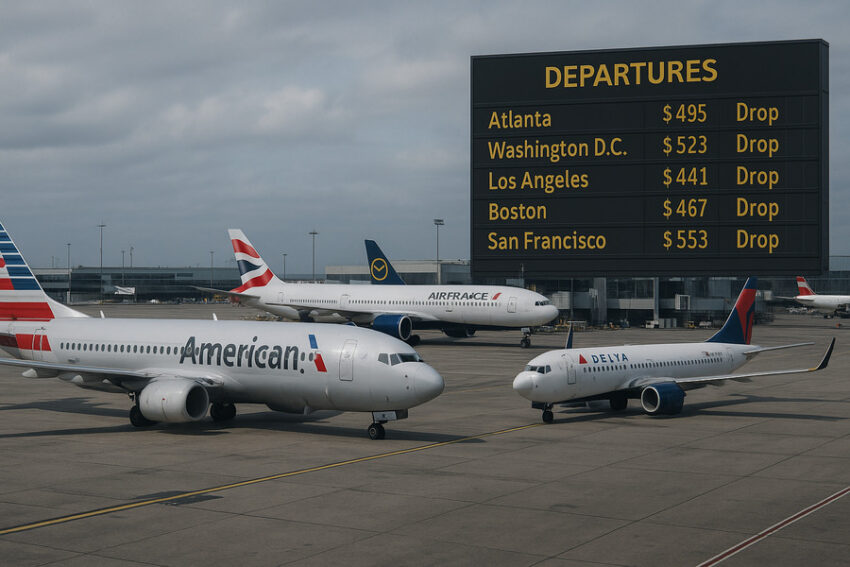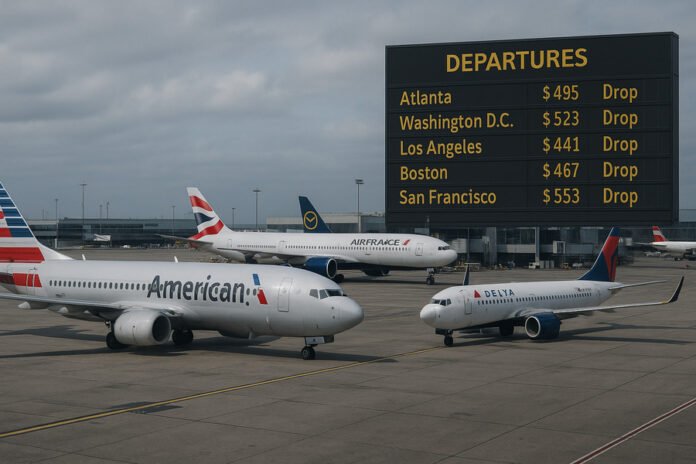Wednesday, June 18, 2025

Europe’s sharp retreat from US travel in May has forced major international airlines—American, Air France, Delta, and British Airways among them—to slash fares to key US cities including Atlanta, Washington D.C., Los Angeles, and Boston, as they face a perfect storm of collapsing bookings, a soaring dollar, and rising demand from travelers in Mexico, Canada, and the Caribbean. What was once a lucrative transatlantic summer season has shifted dramatically, with Western European arrivals falling 4.4 percent last month and a steeper 17 percent decline in March, creating deep uncertainty across the airline sector. As U.S.-bound traffic from Europe stalls, carriers are aggressively discounting fares to keep planes full, pivoting their focus to markets where travel appetite remains strong and summer demand is accelerating. This shift signals not just a temporary pricing strategy, but a broader rebalancing of global travel flows in 2025.
Europe Pulls Back From US Travel in May
The latest travel data shows that overseas arrivals to the United States fell by 2.8 percent in May compared to the same month last year, according to preliminary figures from the U.S. National Travel and Tourism Office (NTTO). More specifically, Western European arrivals dropped 4.4 percent, continuing a broader downtrend that began earlier this year. In March, the decline from Western Europe was even more dramatic, falling 17 percent year-over-year.
While travel from Eastern Europe rose 4.6 percent, the volume from that region isn’t enough to reverse the overall pullback. This slump has sent a clear signal across the aviation industry: demand from Europe to the United States is softening, and airlines are now recalibrating their transatlantic strategies.
Airlines Slash Fares on Core US Routes
In response to the weakening European travel demand, airlines have slashed fares to major U.S. cities. According to Cirium, average round-trip economy fares for more than 50 transatlantic routes are down approximately 7 percent compared to last year. On some routes, the drops are even more aggressive. For example, economy fares between Atlanta and London have plunged by 55 percent, making it one of the steepest single-route declines reported so far in 2025.
Flights to San Francisco, Washington D.C., Los Angeles, and Boston have all seen fare reductions as well, particularly on routes served by American, Delta, Air France, British Airways, and Lufthansa. Hopper reports that the average price for a round-trip ticket from the U.S. to Europe is now $817, which is 10 percent cheaper than last summer and closely mirrors 2019 pre-pandemic levels.
What’s Behind the Freeze?
Several factors are contributing to the freeze in European interest in U.S. travel. One of the biggest drivers is the strong U.S. dollar, which has made vacations in the U.S. significantly more expensive for Europeans. In addition, broader political tensions and stricter U.S. border enforcement policies have added to the perception that America is becoming less welcoming to foreign travelers.
According to industry analysts, transatlantic travel demand started tapering off in early 2025. The slowdown gained momentum after former President Donald Trump reignited global political controversies, including remarks about annexing Greenland, reigniting global trade disputes, and emphasizing harsher U.S. immigration policies. These developments have had a chilling effect on European travel sentiment.
Airlines Rework Strategies to Focus on American Demand
Despite the drop in inbound travel from Europe, airlines say that U.S. outbound demand remains strong. Delta Air Lines revealed that 80 percent of its long-haul international bookings originate in the U.S., helping to cushion the decline in European-origin traffic. United Airlines reported a 6 percent drop in European bookings in the first quarter of the year, but added that strong demand from U.S.-based travelers more than compensated for the losses.
Lufthansa, facing weaker bookings from its home market, has shifted its marketing focus toward U.S.-originating passengers. The German carrier is adjusting transatlantic pricing to keep seats full, especially on U.S.-bound routes. Likewise, Air France-KLM CEO Ben Smith acknowledged a “slight pullback” in transatlantic traffic and indicated that the airline group would lower fares to remain competitive and avoid half-empty cabins during the peak summer period.
American Airlines also expressed confidence in the outbound market, with CFO Devon May stating in May that the company feels “really good about the transatlantic market,” buoyed by resilient U.S. demand despite global uncertainties.
Rising Demand from Mexico, Canada and the Caribbean
As European traffic falters, airlines are leaning heavily on travelers from Mexico, Canada, and the Caribbean to maintain profitability on international routes. According to Hopper, 4.3 percent more international flights are scheduled to depart U.S. airports this summer, signaling strong outbound momentum to alternative destinations.
Carriers have noticed this shift and are expanding their presence in Latin America and the Caribbean to take advantage. Flights from Mexico and the Caribbean into U.S. airports remain consistently strong, with some airlines even boosting capacity to accommodate this spike in demand. Canadian travelers are also playing a crucial role, helping airlines fill the void left by Western Europe’s retreat.
A Tough Year for Transatlantic Profits
Tourism Economics, a subsidiary of Oxford Economics, has warned that 2025 may be a tougher year financially for airlines operating transatlantic routes. Aran Ryan, the firm’s director of industry studies, said that the combination of fewer European travelers to the U.S. and a slower rate of U.S. outbound travel to Europe compared to last year will make profitability harder to achieve.
The pressure to fill seats has pushed airlines to deploy pricing tactics reminiscent of pre-pandemic fare wars. This includes widespread discounting, flash sales, and short-term promotions—all aimed at stimulating demand quickly. For travelers, it means some of the lowest fares on Europe–U.S. routes seen since 2019. But for carriers, it signals leaner margins and intensified competition.
Airlines That Have Reduced Fares or Slashed Routes to the US – May 2025
| Airline | Fare Reductions | Route Cuts or Reductions | Key US Cities Affected | Notes |
|---|---|---|---|---|
| American Airlines | Yes | No major route cuts | Atlanta, Boston, Los Angeles, Washington | Reduced fares due to falling European demand and to boost US traffic |
| Delta Air Lines | Yes | No confirmed route suspensions | Los Angeles, Atlanta, New York, Boston | Lowered fares; relies on US-origin travel to balance load |
| United Airlines | Yes | No confirmed route reductions | San Francisco, Newark, Chicago | Adjusted fares after a 6% drop in Europe-origin bookings |
| Air France KLM | Yes | Scaled back Seattle and Washington D.C. (Air France) | Washington, Boston | Lowering fares and reducing frequencies selectively |
| Lufthansa | Yes | Reduced frequencies, not full suspensions | Chicago, New York, Boston | Shifted focus to US market; cutting prices to sustain demand |
| British Airways | Yes | Suspended Las Vegas; reduced Orlando, Philadelphia | Orlando, Philadelphia, Las Vegas | Cutting low-performing US routes; lowering fares on others |
| Virgin Atlantic | Yes | No full route suspensions | New York, Los Angeles, Miami | Warned of transatlantic slowdown; fares adjusted in Q2 |
| Iberia | Yes | Reduced flights to Chicago and Dallas | New York, Dallas, Chicago | Slashed fares (e.g., Madrid–NYC); reduced capacity on some routes |
Europe’s sharp travel freeze in May forced American, Air France, and Delta to slash fares to Atlanta, Washington, and Boston as European bookings collapsed under the pressure of a soaring dollar and shifting demand. With fewer Europeans flying, airlines are now relying on surging interest from Mexico, Canada, and the Caribbean to keep transatlantic routes afloat.
Europe Steps Back, Americas Step In
In summary, Europe’s travel freeze in May has triggered a chain reaction across the global airline industry. American, Delta, Air France, British Airways, and others are slashing fares on routes to Atlanta, Washington, Los Angeles, and Boston just to keep their planes filled. The strong U.S. dollar, political uncertainty, and a delayed booking environment have pushed travelers from Europe to the sidelines—while demand from Mexico, Canada, and the Caribbean surges into the gap.
Airlines are now adjusting quickly, leaning on U.S.-based travelers and regional neighbors to fill their cabins. Whether this trend persists into the fall or reverses with a shift in global sentiment remains to be seen. But for now, the transatlantic balance has shifted—and Europe’s pause is America’s price drop.
Tags: Air France, Airline News, American, Atlanta, Boston, Canada, caribbean, delta, Europe, mexico, travel industry, Travel News, US, Washington







